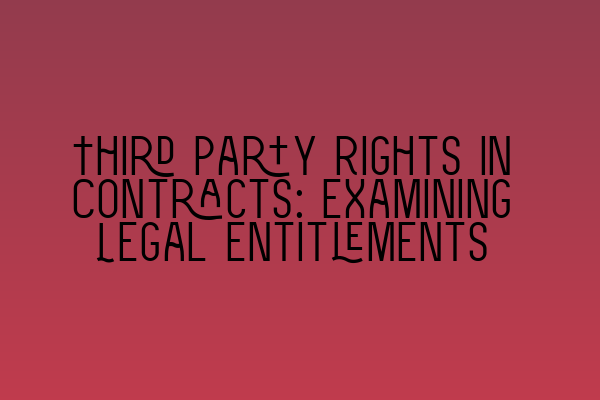Third Party Rights in Contracts: Examining Legal Entitlements
Contracts play a vital role in governing business relationships and ensuring the fulfillment of obligations between parties involved. However, it’s not uncommon for a contract to have an impact on individuals or entities who are not directly party to the agreement. These individuals or entities are known as third parties, and their legal entitlements in contracts are a crucial aspect to consider. In this blog post, we will delve into the concept of third party rights in contracts, explore their legal implications, and discuss the factors that determine their enforcement.
Understanding Third Party Rights
Third party rights refer to the ability of someone who is not a party to a contract to enforce its terms or derive benefits from it. These rights can arise in various situations and hold significant legal weight under certain circumstances. When a contract contains provisions explicitly conferring rights on third parties, it is known as a third-party beneficiary or privity of contract.
It is important to note that not every third party can enforce rights in a contract. The ability to do so depends on the type of third party rights recognized by the law and the specific language and intent of the contract itself.
Types of Third Party Rights
There are two main types of third party rights recognized in contract law:
- Intended Third Party Rights: In certain situations, a contract may explicitly state that it is made for the benefit of a third party. This means that the contracting parties intend for the third party to have the ability to enforce the terms of the contract. For example, imagine a scenario where Company A and Company B enter into a contract for the supply of goods, and the contract specifically mentions that Company C, a logistics provider, is entitled to enforce the terms of the agreement. In this case, Company C is considered an intended third party with enforceable rights.
- Incidental Third Party Rights: Unlike intended third party rights, incidental third party rights arise indirectly from a contract and are not explicitly written into it. These rights arise when certain conditions are met, such as the third party relying on the contract or receiving a benefit from it. However, the enforcement of incidental third party rights can be more complex and is subject to the court’s interpretation. Courts typically consider factors such as the intention of the contracting parties and the reasonable expectations of the third party to determine the enforceability of incidental rights.
The distinction between intended and incidental third party rights is critical when examining the legal entitlements of third parties in contracts. It defines the extent to which a third party can enforce the terms of an agreement and holds the contracting parties accountable for fulfilling their obligations towards the third party.
Factors Affecting the Enforceability of Third Party Rights
While third party rights can arise in specific contract situations, their enforceability is subject to various factors that need to be considered:
- Express Contractual Provisions: The most effective way to ensure the enforceability of third party rights is by explicitly stating and defining them within the contract. This can be done through clear language and provisions that confer the intended benefits on the third party. This practice is common in contracts involving insurance policies, wills, and trusts.
- Intention of the Contracting Parties: The intent of the contracting parties is a crucial factor in determining whether third party rights can be enforced. If it can be demonstrated that the parties intended for a third party to have enforceable rights, such as in the case of intended third party rights, the court is more likely to enforce those rights.
- Consideration: Consideration refers to the exchange of something of value between the contracting parties. It plays a significant role in contract formation and can impact the enforceability of third party rights. If the third party provided consideration or gave something of value in exchange for the promise in the contract, it strengthens their entitlement to enforce the agreement.
- Privity of Contract: Privity of contract refers to the relationship between the parties to a contract, wherein only the parties involved have enforceable rights and obligations. Traditionally, a third party without privity of contract had no ability to enforce its terms. However, the law has evolved to recognize certain exceptions, such as those pertaining to intended and incidental third party rights.
It is important to consult legal advice when dealing with third party rights in contracts, as the nuances and enforceability of such rights can vary depending on the jurisdiction and specific circumstances involved.
Conclusion
Third party rights in contracts play a critical role in determining the legal entitlements of individuals or entities not directly involved in the agreement. Whether these rights are intended or incidental, their enforceability is subject to various factors such as express contractual provisions, the intention of the contracting parties, consideration, and privity of contract. Understanding and considering these factors is vital to ensuring that the rights of all parties involved are respected and upheld.
For more insights into legal practice and decision-making, check out our article on real-life case studies.
If you’re interested in pursuing a legal career, take a look at our article on solicitor salaries in the UK to gain an understanding of average earnings and factors that can affect your income.
To enhance client relationships and build trust and loyalty, solicitors should master client relationship management skills. Read our article on enhancing trust and loyalty through client relationship management.
For aspiring solicitors, we have a comprehensive article on choosing the right path for your future when it comes to pursuing a law school education in the UK.
Finally, if you’re interested in becoming a solicitor, our article on securing training contracts provides a roadmap to help you achieve your goal.
